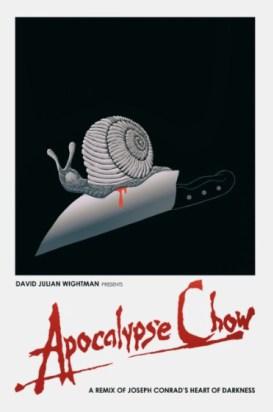 ‘Mistah Kurtz – he dead’: a book review of Apocalypse Chow, a novel by David Julian Wightman
‘Mistah Kurtz – he dead’: a book review of Apocalypse Chow, a novel by David Julian Wightman
The subtitle to Apocalypse Chow describes it as a ‘remix of Joseph Conrad’s Heart of Darkness’. Pastiche, parody, or whatever we wish to call it is a difficult art, made more difficult if the original is a pillar of the western literary canon of which many people have heard, but few have read. Conrad’s prose is too dense and allusive for contemporary tastes, the novel was written a long time ago, and one has to be prepared to work hard to get to grips with it.
Of course, Conrad’s Heart of Darkness (1899) has been ‘remixed’ and reincarnated many times before Apocalypse Chow. Eliot referenced it in The Hollow Men (1925), for example, and the novel has been repeatedly excavated by literary and postcolonial scholars for its buried racism. The phrase ‘heart of darkness’ has become enshrined, albeit awkwardly, in the store cupboard of phrases to be trotted out by authors as a shorthand for Conrad’s evocation of evil, mystery and madness (including, if I remember correctly, myself).
As its cover typography immediately signals, Apocalypse Chow approaches Conrad’s novel via Francis Ford Coppola’s Apocalypse Now (1979), which was ‘inspired’ by Conrad’s masterpiece. Thus, as well as Conrad’s majestic prose style, Apocalypse Chow also reimagines scenes from the film that have acquired a life of their own apart from the larger work. Robert Duvall’s Colonel Kilgore, who blasts the enemy with Wagner’s Ride of the Valkyries from his Huey attack helicopters, and who famously claims ‘I love the smell of napalm in the morning’, is transformed into a Canadian veteran who drives a chip wagon that blares precisely the same music as it pulls into town. ‘I love the smell of bacon in the morning …’ he admits.
Kurtz, the mysterious genius who has gone rogue upriver, is Chef Kurtz in Wightman’s novel, and, indeed, the story of Marlow’s quest for Kurtz now unfolds as a narrative of the restaurant business told by Marlow himself late one night around the dinner table of a New York restaurant. Marlow, we are told, was given the task by his employers to track down Kurtz in the Canadian wilderness and fire him. According to them, Kurtz had made Chow restaurant one of the best in the world with his innovative cuisine, but now he had gone mad and had to be evicted.
If Apocalypse Chow sounds odd it is because it is odd. It is entertaining for anyone familiar with the works it lovingly skewers (note the culinary metaphor) and it is strangely compelling even if, like me, you haven’t read Conrad for a long time. It is quietly witty and also serious. It manages to borrow something of the gravitas of Conrad’s novel and – like all good parody – it makes you want to return to the original for a fresh look.
For an example of its humour, take this passage from the novel’s description of Marlow’s river journey:
Cutlery, for Christ’s sake! We were being attacked with cutlery. Forks and knives and spoons were raining down on the boat. There were even metal chopsticks thrown at us; empty tin cans and broken old pots and pans flying through the air.
When Chow opened for the first time, Chef Kurtz cooked up meals comprising such unlikely dishes as:
Malaysian Edible-nest Swiflet soup – made from a single nest constructed entirely from the bird’s saliva, if you can believe it – garnished with a fried African guinea fowl egg, black osetra sturgeon caviar, and Himalayan rock salt. Imagine the expense! Next came a procession of charcuterie items served on individual planks of Lebanese cedar.
Kurtz’s madness – his sin against the increasingly desperate exaggeration of haute cuisine embodied above – is suddenly to turn his back on such unsustainable extravagance, and to research, discover and utilize the edible flora and fauna of the local wilderness, creating an entirely different kind of cuisine for the future. The apocalyptic last supper served at Chow features a cornucopia of little-known nuts and berries, plus a selection of predatory invasive species, all of which serves as an edible symbol of humanity’s greed: Kurtz is undisturbed by ‘the horror’ of the world; rather, it is ‘The hunger! The hunger!’ that obsesses him. ‘Don’t you see, Marlow,’ he says, ‘humans are the ultimate invasive species.’
Kurtz himself recites from Eliot’s The Hollow Men and, after serving Chow’s final meal, he gives a lecture to his rapt admirers:
Imagine an ocean without sharks or tuna … The time will soon come when there are none left, for we are eating them into extinction. Imagine a world without honeybees, the humble creatures that pollinate almost all the crops we consume, yet are dying in their billions because of climate change, and our industrial agriculture’s addiction to pesticides. Imagine a world without mountain gorillas, tigers, or polar bears. These species will be lost as we devour their habitats.
Humour blends seamlessly with this sudden seriousness, much of which is allusive and elusive. For instance, just the one word, upriver, evokes more mystery and menace than one can immediately account for. An individual’s capacity for uncritical admiration is incarnated by the restaurant critic who has ‘not critiqued his passion, his own blind loyalty [to Kurtz]. It came to him, and he accepted it with a sort of eager fatalism.’ The uncritical Critic is as purblind as the similarly obsessed photographer in Apocalypse Now.
The boat Marlow takes upriver is called Blacky’s Barge. It is as if the relocation from Conrad’s Africa (the Heart of Darkness) and the Vietnam of Apocalypse Now (denuded of its rightful inhabitants so as to repaint the war – and indeed Colonel Kurtz – as a solely American tragedy) to the wilds of Canada has brought with it the first foray of the hitherto occluded subaltern colonial Other, still inflected with a racist slur. The entirely coincidental resonance of the author’s surname acts as an accidental indicator of racial hegemony.
Of course, Kurtz is right about food and our place in Nature. Our hunger is our greed, and greed has destroyed too much for the world to recover. Thus:
Kurtz’s words had behind them a terrible suggestion of things heard in dreams, of phrases spoken in nightmares. He wasn’t a lunatic. Chef’s intelligence was perfectly clear, and concentrated upon himself with horrible intensity.
Apocalypse Chow is a short work of humble ambition, many of whose virtues are probably emergent properties rather than intended outcomes. Perhaps it is best read for humor and entertainment (excellent reasons to read anything), so that its seriousness can creep up on you like an unexamined appetite. ‘The hunger! The hunger!’
David Julian Wightman | ISBN 9781775357902 (pbk) | ebook
Purchase Options
